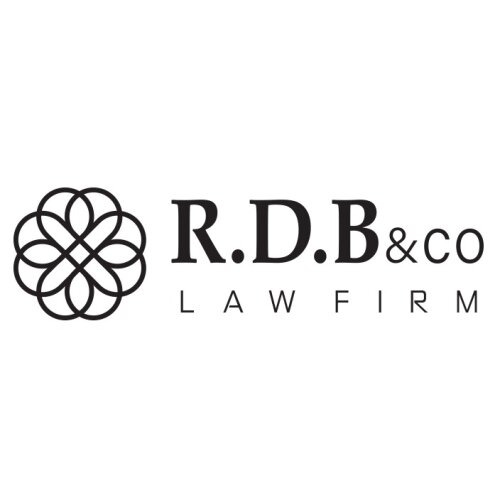Best Renewable & Alternative Energy Lawyers in Petaẖ Tiqwa
Share your needs with us, get contacted by law firms.
Free. Takes 2 min.
List of the best lawyers in Petaẖ Tiqwa, Israel
About Renewable & Alternative Energy Law in Petaẖ Tiqwa, Israel
Petaẖ Tiqwa, located near Tel Aviv, is experiencing a growing interest in renewable and alternative energy. This trend follows national efforts in Israel to transition towards more sustainable energy sources, with a focus on solar power, wind energy, and energy efficiency. Laws and regulations in the area are shaped by both local municipality ordinances and national policies overseen by the Ministry of Energy. Whether for private residences, commercial properties, or industrial facilities, legal requirements and incentives can influence how renewable and alternative energy projects are planned, built, and connected to the national grid.
Why You May Need a Lawyer
Legal support is crucial for navigating the complex landscape of renewable and alternative energy projects in Petaẖ Tiqwa. Here are some common scenarios where legal assistance is important:
- Negotiating power purchase agreements for solar panel installations on residential or commercial properties
- Applying for permits and approvals for renewable energy infrastructure such as rooftop solar arrays or small wind turbines
- Understanding and leveraging government incentives or subsidies for clean energy
- Resolving disputes involving energy service providers, neighbors, or contractors
- Ensuring compliance with zoning, building, and environmental regulations
- Managing joint ventures or community solar projects involving multiple stakeholders
- Protecting intellectual property related to innovative renewable energy technologies
Local Laws Overview
Petaẖ Tiqwa’s renewable and alternative energy regulations are influenced by both municipal guidelines and nationwide mandates. Key aspects to consider include:
- Permitting and Licensing: The municipality requires permits for installing solar panels, wind turbines, and other energy systems. Applicants must comply with safety and architectural standards.
- Grid Connection: Israel Electric Corporation governs the procedure for connecting residential, commercial, or industrial renewable energy systems to the national grid, including net metering arrangements.
- Building Codes: Updates to local building codes may encourage or require energy efficiency in new construction or major renovations, impacting both developers and homeowners.
- Incentives: National and local programs may provide rebates or tax benefits for eligible renewable energy projects, subject to strict eligibility requirements.
- Environmental Compliance: Projects must meet environmental standards to minimize impacts on the surroundings and avoid penalties.
Frequently Asked Questions
What types of renewable energy projects are most common in Petaẖ Tiqwa?
The most common projects are rooftop solar panel installations for homes and businesses, with some interest in small-scale wind turbines and solar thermal systems.
Do I need a permit to install solar panels on my property?
Yes, you generally need municipal approval before installing solar panels to ensure compliance with building and electrical safety standards.
Are there financial incentives for installing renewable energy in Petaẖ Tiqwa?
There are government incentives, such as tax credits or rebates, but eligibility depends on project type and compliance with regulations.
Can I sell excess electricity produced by my solar panels to the national grid?
Yes, Israel allows net metering, which enables you to feed excess electricity back into the grid and receive credits or payments under regulated terms.
What legal steps should I take before starting a renewable energy project?
You should consult with a legal professional to review property rights, obtain necessary permits, and ensure contract and regulatory compliance.
How are community solar projects regulated in Petaẖ Tiqwa?
Community projects are subject to cooperative agreements, joint financing structures, and must meet the same permitting, grid, and environmental standards as individual projects.
What happens if my project violates zoning or environmental laws?
Violating local regulations can lead to fines, orders to remove installations, and potential civil or criminal liability.
Who regulates energy supply and grid connection in Petaẖ Tiqwa?
The Israel Electric Corporation and the Ministry of Energy set the rules for connecting to the grid, while the municipality handles local permissions.
Is it possible to set up an off-grid renewable energy system?
Off-grid systems are allowed, but you still need to comply with safety standards and permitting requirements to ensure legality and safety.
Should I have a contract with an energy developer or installation company?
Absolutely. Well-drafted contracts protect your interests regarding installation timelines, warranty terms, liability, and potential disputes.
Additional Resources
If you need more information or further guidance, consider consulting with the following organizations:
- Israeli Ministry of Energy - Renewable Energy Department
- Petaẖ Tiqwa Municipality - Environmental Department and Engineering Division
- Israel Electric Corporation - Customer Services for Renewable Projects
- Israel Green Building Council
- Association of Renewable Energy Companies in Israel
Next Steps
If you are considering a renewable or alternative energy project in Petaẖ Tiqwa, Israel, or you find yourself facing a legal issue related to such a project:
- Begin by outlining your goals and the type of project you are interested in pursuing.
- Gather all relevant documents regarding your property and the proposed installation.
- Consult with a lawyer who specializes in renewable and alternative energy law in Israel to assess your legal position and options.
- Work with your legal advisor when submitting permit applications, negotiating contracts, or resolving any disputes.
- Contact relevant authorities or resources listed above for additional support and up-to-date guidance on local regulations.
Taking proactive legal steps will help ensure the success and compliance of your renewable or alternative energy project in Petaẖ Tiqwa.
Lawzana helps you find the best lawyers and law firms in Petaẖ Tiqwa through a curated and pre-screened list of qualified legal professionals. Our platform offers rankings and detailed profiles of attorneys and law firms, allowing you to compare based on practice areas, including Renewable & Alternative Energy, experience, and client feedback.
Each profile includes a description of the firm's areas of practice, client reviews, team members and partners, year of establishment, spoken languages, office locations, contact information, social media presence, and any published articles or resources. Most firms on our platform speak English and are experienced in both local and international legal matters.
Get a quote from top-rated law firms in Petaẖ Tiqwa, Israel — quickly, securely, and without unnecessary hassle.
Disclaimer:
The information provided on this page is for general informational purposes only and does not constitute legal advice. While we strive to ensure the accuracy and relevance of the content, legal information may change over time, and interpretations of the law can vary. You should always consult with a qualified legal professional for advice specific to your situation.
We disclaim all liability for actions taken or not taken based on the content of this page. If you believe any information is incorrect or outdated, please contact us, and we will review and update it where appropriate.









